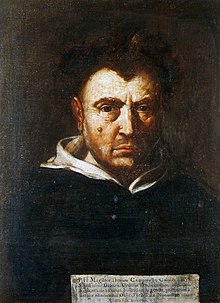Tommaso Campanella
|
Tommaso Campanella OP |
|
|---|---|

Tommaso Campanella depicted by Francesco Cozza
|
|
| Born |
5 September 1568 Stignano, Kingdom of Sicily |
| Died | 21 May 1639 (aged 70) Paris, Kingdom of France |
| Nationality | Italian |
| Occupation | philosopher, theologian, astrologer, poet |
| Years active | 1597–1634 |
Tommaso Campanella OP (Italian: [tomˈmazo kampaˈnɛlla]; 5 September 1568 – 21 May 1639), baptized Giovanni Domenico Campanella, was a Dominican friar, Italian philosopher, theologian, astrologer, and poet.
Born in Stignano (in the county of Stilo) in the province of Reggio di Calabria in Calabria, southern Italy, Campanella was a child prodigy. Son of a poor and illiterate cobbler, he entered the Dominican Order before the age of fourteen, taking the name of fra' Tommaso in honour of Thomas Aquinas. He studied theology and philosophy with several masters.
Early on, he became disenchanted with the Aristotelian orthodoxy and attracted by the empiricism of Bernardino Telesio (1509–1588), who taught that knowledge is sensation and that all things in nature possess sensation. Campanella wrote his first work, Philosophia sensibus demonstrata ("Philosophy demonstrated by the senses"), published in 1592, in defence of Telesio.
In 1590 he was in Naples where he was initiated in astrology; astrological speculations would become a constant feature in his writings. Campanella's heterodox views, especially his opposition to the authority of Aristotle, brought him into conflict with the ecclesiastical authorities. Denounced to the Inquisition, he was arrested in Padua in 1594 and cited before the Holy Office in Rome, he was confined in a convent until 1597.
...
Wikipedia
